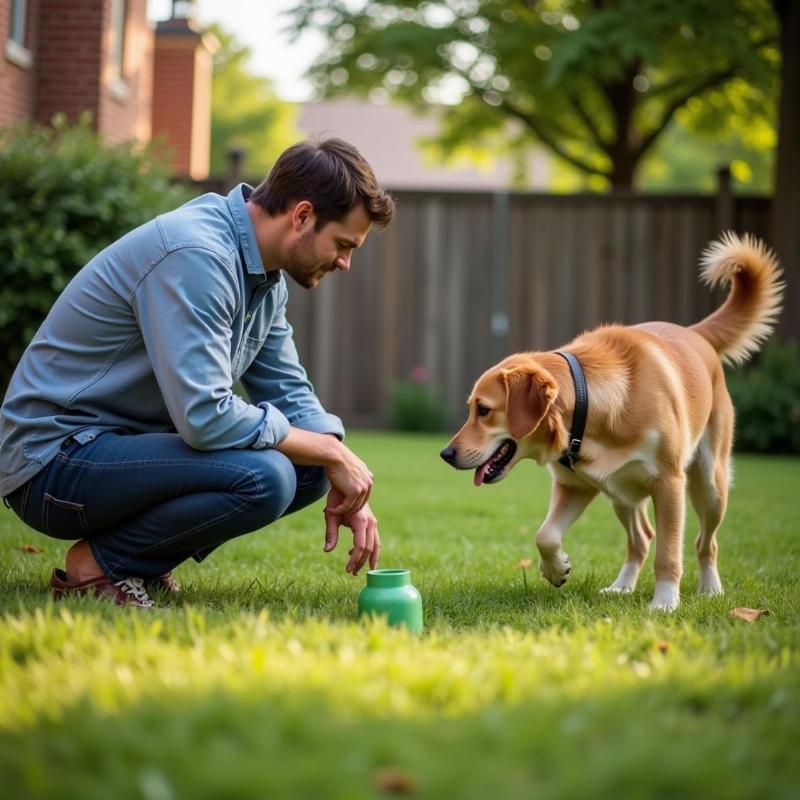Carpet stains and that lingering odor? It’s a common struggle for dog owners. Learning how to prevent your dog from peeing on the carpet isn’t just about preserving your home, it’s about understanding your furry friend and addressing the root cause of the behavior. This guide will provide practical, vet-approved tips and strategies to help you tackle this frustrating issue and create a harmonious home for both you and your canine companion.
Understanding Why Dogs Pee on the Carpet
Before we dive into solutions, it’s crucial to understand why your dog is peeing on the carpet. Is it a medical issue, a behavioral problem, or simply a lack of proper house training? Identifying the cause is the first step to effectively preventing future accidents. Medical reasons can include urinary tract infections, bladder stones, diabetes, or even age-related incontinence. Behavioral reasons could stem from anxiety, territorial marking, or even submission.
Establishing a Potty Training Routine
A consistent potty training routine is essential for all dogs, regardless of age. Take your dog outside frequently, especially first thing in the morning, after meals, after naps, and before bedtime. Choose a designated potty spot in your yard and reward your dog with praise and a small treat immediately after they eliminate in the correct location. Consistency and positive reinforcement are key!
 Consistent Potty Breaks for Dogs
Consistent Potty Breaks for Dogs
Cleaning Up Accidents Effectively
If an accident does happen, it’s vital to clean the area thoroughly to eliminate any lingering odor that could attract your dog back to the same spot. Use an enzymatic cleaner specifically designed for pet urine, as these products break down the uric acid that causes the persistent smell. Avoid ammonia-based cleaners, as the smell can resemble urine and actually encourage your dog to pee there again.
Addressing Medical Concerns
If your dog suddenly starts having accidents after being reliably house-trained, a trip to the veterinarian is crucial. Your vet can rule out any underlying medical conditions that might be contributing to the problem. Early diagnosis and treatment are essential for your dog’s overall health and well-being.
Managing Anxiety and Stress
Anxiety and stress can also lead to inappropriate urination. If you suspect this might be the case, try to identify and minimize stressors in your dog’s environment. Creating a safe and comfortable space for your dog, providing plenty of exercise and mental stimulation, and using calming aids like pheromone diffusers can help reduce anxiety and promote relaxation.
Crate Training and Confinement
Crate training can be a valuable tool in preventing accidents, especially for puppies or dogs still learning house-training. A crate provides a den-like space where dogs instinctively avoid soiling. Ensure the crate is appropriately sized for your dog – large enough for them to stand, turn around, and lie down comfortably.
Seeking Professional Help
If you’re struggling to prevent your dog from peeing on the carpet, don’t hesitate to seek professional help from a certified dog trainer or veterinary behaviorist. They can assess your dog’s behavior, identify the underlying cause of the problem, and develop a personalized training plan to address the issue effectively.
Conclusion
Preventing your dog from peeing on the carpet requires patience, consistency, and a comprehensive approach. By addressing both medical and behavioral factors, establishing a solid potty training routine, and utilizing effective cleaning techniques, you can create a clean and harmonious home for both you and your beloved canine companion. Remember, addressing the root cause is key to long-term success!
FAQ
- Why does my dog pee on the carpet even though he’s house-trained? Sudden changes in behavior can indicate a medical issue, so consult your vet. Stress or anxiety could also be factors.
- What’s the best way to clean dog urine from the carpet? Use an enzymatic cleaner specifically designed for pet urine to eliminate the odor completely.
- How can I prevent my dog from marking territory inside the house? Neutering or spaying can help reduce marking behavior. Consistent training and cleaning are also essential.
- Is it too late to house-train an older dog? It’s never too late! Older dogs can learn new tricks with patience and positive reinforcement.
- How long does it usually take to house-train a dog? It varies depending on the dog’s age, breed, and individual temperament, but it typically takes several weeks to months.
- What are some signs of a urinary tract infection in dogs? Frequent urination, straining to urinate, blood in the urine, and excessive licking of the genital area are common signs.
- Can anxiety medication help with inappropriate urination? In some cases, yes. Consult your veterinarian to determine if medication is appropriate for your dog.
Related Articles on Beautdogs.us
- how to prevent dog from peeing on carpet
- how to make your dog stop peeing on the carpet
- what does dog urine smell like
- how to keep the dog from peeing on the carpet
Beautdogs.us is your premier online resource for comprehensive dog care information, breed-specific guidance, and top-quality product recommendations. Whether you’re a seasoned dog owner or just starting your journey, Beautdogs.us offers expert advice on everything from training and nutrition to health and wellness. We empower you to provide the best possible care for your canine companion. Contact us for personalized support: Email: [email protected], Phone: +1 501-555-7529. Visit Beautdogs.us today!